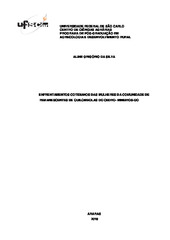Mostrar el registro sencillo del ítem
Enfrentamentos cotidianos das mulheres da comunidade de remanescentes de quilombolas do Cedro - Mineiros - GO
| dc.contributor.author | Silva, Aline Grigório da | |
| dc.date.accessioned | 2020-05-12T01:38:29Z | eng |
| dc.date.available | 2020-05-12T01:38:29Z | eng |
| dc.date.issued | 2019-03-28 | eng |
| dc.identifier.citation | SILVA, Aline Grigório da. Enfrentamentos cotidianos das mulheres da comunidade de remanescentes de quilombolas do Cedro - Mineiros - GO. 2019. Dissertação (Mestrado em Agroecologia e Desenvolvimento Rural) – Universidade Federal de São Carlos, Araras, 2019. Disponível em: https://repositorio.ufscar.br/handle/ufscar/12703. | * |
| dc.identifier.uri | https://repositorio.ufscar.br/handle/ufscar/12703 | por |
| dc.description.abstract | This study was carried out in the southwestern region of Goiás, an area dominated by agribusiness. The objective of this study was to investigate daily practices, daily experiences, responsible for the production of commodities with high employment of technologies. It is in this scenario that the community of quilombola remnants of the cedar is inserted. The quilombola communities are scattered throughout the Brazilian territory, fighting and resisting to be able to remain in their territories. women are the main responsible for maintaining the identity traits of the community, which are directly linked to the relationship that residents have established over the years with the cerrado and medicinal plants. The methodological process to answer the objectives of this dissertation had a qualitative character and was developed based on Ethnography a methodology that allowed an approximation of the studied group, during the field work the data collection was made from semistructured interviews with the help of the field notebook which was fundamental for the registration of the researcher impression. It was noted that women in the community increased their participation in the labor market, but that it continues to lead the family. It was possible to find out that transformations are taking place in the patterns of values related to the sociocultural role of women. Women have been divided between domestic, social and political space. Demonstrating engagement to take leadership roles within and outside the community. | eng |
| dc.description.sponsorship | Coordenação de Aperfeiçoamento de Pessoal de Nível Superior (CAPES) | por |
| dc.language.iso | por | por |
| dc.publisher | Universidade Federal de São Carlos | por |
| dc.rights.uri | Acesso aberto | por |
| dc.subject | Quilombolas | por |
| dc.subject | Saberes tradicionais | por |
| dc.subject | Trabalho da mulher | por |
| dc.subject | Soberania alimentar | por |
| dc.subject | Plantas medicinais | por |
| dc.subject | Traditional knowledge | eng |
| dc.subject | Women's work | eng |
| dc.subject | Food sovereignty | eng |
| dc.subject | Medicinal plants | eng |
| dc.title | Enfrentamentos cotidianos das mulheres da comunidade de remanescentes de quilombolas do Cedro - Mineiros - GO | por |
| dc.title.alternative | Everyday courses of women of the community of remanescentes of quilombolas in Cedro - Mineiros - GO | eng |
| dc.type | Dissertação | por |
| dc.contributor.advisor1 | Borges, Janice Rodrigues Placeres | |
| dc.contributor.advisor1Lattes | http://lattes.cnpq.br/2373278362705384 | por |
| dc.contributor.advisor-co1 | Silva, Jesiel Souza | |
| dc.contributor.advisor-co1Lattes | http://lattes.cnpq.br/1262375754694269 | por |
| dc.description.resumo | O presente trabalho tem como objetivo realizar uma investigação sobre as práticas cotidianas, vivências cotidianas, enfrentamentos e realidade das mulheres da comunidade de remanescentes de quilombolas do Cedro, em Mineiros - Go. Este estudo foi realizado na região sudoeste de Goiás, área dominada pelo agronegócio, responsável pela produção de commodities com alto emprego de tecnologias. É neste cenário que a comunidade de remanescentes de quilombolas do Cedro está inserida. As comunidades quilombolas estão espalhadas por todo território brasileiro, lutando e resistindo para conseguir se manter em seus territórios. As mulheres são as principais responsáveis pela manutenção dos traços identitários da comunidade, que estão diretamente ligados à relação que os moradores estabeleceram ao longo dos anos com o cerrado e as plantas medicinais. A metodologia para responder aos objetivos desta dissertação teve caráter qualitativo e foi desenvolvida com base na Etnografia, uma metodologia antropológica que permitiu uma aproximação do grupo estudado. Durante o trabalho de campo, a coleta de dados foi feita a partir de entrevistas semiestruturadas com auxílio do caderno de campo, que foi fundamental para o registro da impressão de pesquisador. Observou-se que as mulheres da comunidade aumentaram sua participação no mercado de trabalho, mas que continuam à frente da família. Foi possível averiguar que estão acontecendo transformações nos padrões de valores relativos ao papel sociocultural da mulher. As mulheres têm se dividido entre o espaço doméstico, social e político, demostrando engajamento para assumir papeis de liderança dentro e fora da comunidade. | por |
| dc.publisher.initials | UFSCar | por |
| dc.publisher.program | Programa de Pós-Graduação em Agroecologia e Desenvolvimento Rural - PPGADR-Ar | por |
| dc.subject.cnpq | CIENCIAS HUMANAS::SOCIOLOGIA::SOCIOLOGIA RURAL | por |
| dc.description.sponsorshipId | CAPES: 001 | por |
| dc.ufscar.embargo | Online | por |
| dc.publisher.address | Câmpus Araras | por |
| dc.contributor.authorlattes | http://lattes.cnpq.br/5669951231066513 | por |
